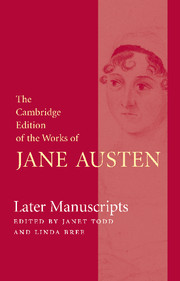Sanditon
Published online by Cambridge University Press: 18 December 2020
Summary
Chapter 1
A gentleman and lady travelling from Tunbridge towards that part of the Sussex coast which lies between Hastings and East Bourne, being induced by business to quit the high road, and attempt a very rough lane, were overturned in toiling up its long ascent—half rock, half sand. The accident happened just beyond the only gentleman's house near the lane—a house, which their driver, on being first required to take that direction, had conceived to be necessarily their object, and had with most unwilling looks been constrained to pass by—. He had grumbled and shaken his shoulders so much indeed, and pitied and cut his horses so sharply, that he might have been open to the suspicion of overturning them on purpose (especially as the carriage was not his master’s) if the road had not indisputably become considerably worse than before, as soon as the premises of the said house were left behind—expressing with a most intelligent portentous countenance that beyond it no wheels but cart wheels could safely proceed.
The severity of the fall was broken by their slow pace and the narrowness of the lane, and the gentleman having scrambled out and helped out his companion, they neither of them at first felt more than shaken and bruised. But the gentleman had in the course of the extrication sprained his foot—and soon becoming sensible of it was obliged in a few moments to cut short both his remonstrance to the driver and his congratulations to his wife and himself—and sit down on the bank, unable to stand.—
“There is something wrong here,” said he—putting his hand to his ancle—“But never mind, my dear—(looking up at her with a smile)—it could not have happened, you know, in a better place.—Good out of evil—. The very thing perhaps to be wished for. We shall soon get relief.—There, I fancy lies my cure”—pointing to the neat-looking end of a cottage, which was seen romantically situated among wood on a high eminence at some little distance.—“Does not that promise to be the very place?—”
- Type
- Chapter
- Information
- Later Manuscripts , pp. 137 - 210Publisher: Cambridge University PressPrint publication year: 2008
- 1
- Cited by

